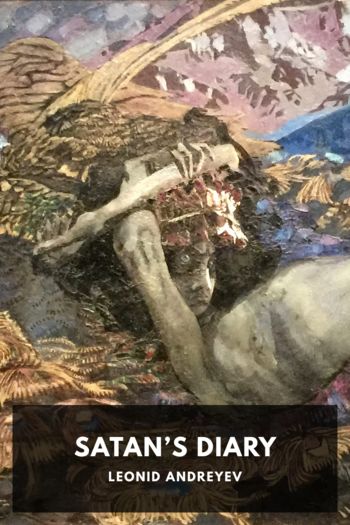Short Fiction - M. R. James (mobile ebook reader .txt) 📗

- Author: M. R. James
Book online «Short Fiction - M. R. James (mobile ebook reader .txt) 📗». Author M. R. James
Exactly what explanation was patched up for the staff and visitors at the hotel I must confess I do not recollect. The Professor was somehow cleared of the ready suspicion of delirium tremens, and the hotel of the reputation of a troubled house.
There is not much question as to what would have happened to Parkins if the Colonel had not intervened when he did. He would either have fallen out of the window or else lost his wits. But it is not so evident what more the creature that came in answer to the whistle could have done than frighten. There seemed to be absolutely nothing material about it save the bedclothes of which it had made itself a body. The Colonel, who remembered a not very dissimilar occurrence in India, was of the opinion that if Parkins had closed with it it could really have done very little, and that its one power was that of frightening. The whole thing, he said, served to confirm his opinion of the Church of Rome.
There is really nothing more to tell, but, as you may imagine, the Professor’s views on certain points are less clear cut than they used to be. His nerves, too, have suffered: he cannot even now see a surplice hanging on a door quite unmoved, and the spectacle of a scarecrow in a field late on a winter afternoon has cost him more than one sleepless night.
The Treasure of Abbot Thomas I“Verum usque in præsentem diem multa garriunt inter se Canonici de abscondito quodam istius Abbatis Thomæ thesauro, quem sæpe, quanquam adhuc incassum, quæsiverunt Steinfeldenses. Ipsum enim Thomam adhuc florida in ætate existentem ingentem auri massam circa monasterium defodisse perhibent; de quo multoties interrogatus ubi esset, cum risu respondere solitus erat: ‘Job, Johannes, et Zacharias vel vobis vel posteris indicabunt’; idemque aliquando adiicere se inventuris minime invisurum. Inter alia huius Abbatis opera, hoc memoria præcipue dignum iudico quod fenestram magnam in orientali parte alæ australis in ecclesia sua imaginibus optime in vitro depictis impleverit: id quod et ipsius effigies et insignia ibidem posita demonstrant. Domum quoque Abbatialem fere totam restauravit: puteo in atrio ipsius effosso et lapidibus marmoreis pulchre cælatis exornato. Decessit autem, morte aliquantulum subitanea perculsus, ætatis suæ anno lxxiido, incarnationis vero Dominicæ mdxxixo.”
“I suppose I shall have to translate this,” said the antiquary to himself, as he finished copying the above lines from that rather rare and exceedingly diffuse book, the Sertum Steinfeldense Norbertinum.5 “Well, it may as well be done first as last,” and accordingly the following rendering was very quickly produced:
“Up to the present day there is much gossip among the Canons about a certain hidden treasure of this Abbot Thomas, for which those of Steinfeld have often made search, though hitherto in vain. The story is that Thomas, while yet in the vigour of life, concealed a very large quantity of gold somewhere in the monastery. He was often asked where it was, and always answered, with a laugh: ‘Job, John, and Zechariah will tell either you or your successors.’ He sometimes added that he should feel no grudge against those who might find it. Among other works carried out by this Abbot I may specially mention his filling the great window at the east end of the south aisle of the church with figures admirably painted on glass, as his effigy and arms in the window attest. He also restored almost the whole of the Abbot’s lodging, and dug a well in the court of it, which he adorned with beautiful carvings in marble. He died rather suddenly in the seventy-second year of his age, AD 1529.”
The object which the antiquary had before him at the moment was that of tracing the whereabouts of the painted windows of the Abbey Church of Steinfeld. Shortly after the Revolution, a very large quantity of painted glass made its way from the dissolved abbeys of Germany and Belgium to this country, and may now be seen adorning various of our parish churches, cathedrals, and private chapels. Steinfeld Abbey was among the most considerable of these involuntary contributors to our artistic possessions (I am quoting the somewhat ponderous preamble of the book which the antiquary wrote), and the greater part of the glass from that institution can be identified without much difficulty by the help, either of the numerous inscriptions in which the place is mentioned, or of the subjects of the windows, in which several well-defined cycles or narratives were represented.
The passage with which I began my story had set the antiquary on the track of another identification. In a private chapel—no matter where—he had seen three large figures, each occupying a whole light in a window, and evidently the work of one artist. Their style made it plain that that artist had been a German of the sixteenth century; but hitherto the more exact localizing of them had been a puzzle. They represented—will you be surprised to hear it?—Job Patriarcha, Johannes Evangelista, Zacharias Propheta, and each of them held a book or scroll, inscribed with a sentence from his writings. These, as a matter of course, the antiquary had noted, and had been struck by the curious way in which they differed from any text of the Vulgate that he had been able to examine. Thus the scroll in Job’s hand was inscribed: “Auro est locus in quo absconditur” (for “





Comments (0)